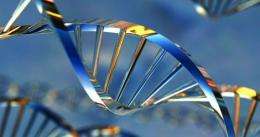Scientists unlock genetics of joint disorder ankylosing spondylitis

(Medical Xpress) -- A study involving over 5,000 people living with the joint disorder ankylosing spondylitis has identified a series of genetic variants associated with increased susceptibility to the condition as well as providing new clues to how the condition may be treated in the future.
A series of genetic variants associated with the joint disorder ankylosing spondylitis has been identified in a study involving Oxford University researchers. The findings provide new clues as to how the condition may be treated in the future.
The study, a collaboration between the Australo-Anglo-American Spondyloarthritis Consortium and the Wellcome Trust Case Control Consortium, also provides one of the first confirmed examples of gene-gene interaction seen in humans.
Professor Peter Donnelly from the University of Oxford, Chair of the Wellcome Trust Case Control Consortium, says: ‘Thanks to over 5,000 people with ankylosing spondylitis who have provided DNA samples, we were able to undertake the largest study of the genetics of this painful and often disabling disease. It revealed important, and in some cases surprising, new insights into the disease.’
Ankylosing spondylitis is an autoimmune disease that affects as many as one in 200 men and one in 500 women in the UK, typically striking people in their late teens and twenties.
While it mainly affects the spine, it can also affect other joints, tendons and ligaments. More rarely, it can affect other areas, such as the eyes, lungs, bowel and heart.
New genes identified
The new research, carried out in the UK, Australia and North America, compared the genomes of 3,023 people with ankylosing spondylitis against those of 8,779 healthy controls. This identified a series of new genetic regions implicated in the disease. The findings were then confirmed in an independent cohort of 2,111 cases and 4,483 controls. The results are published in the journal Nature Genetics.
The researchers identified three regions of the genome – RUNX3, LTBR and TNFRSF1A – in which genetic variants were strongly associated with ankylosing spondylitis. In addition, they found a further four which are likely candidates: PTGER4, TBKBP1, ANTXR2 and CARD9.
The findings also strengthen evidence that a particular process by which signals are transmitted within cells – known as the IL-23R pathway – is involved in the disorder and could be a target for drugs.
Insight into disease processes
The study provided clues as to why a particular genetic variant known as HLA-B27 is associated with the disease.
Scientists have known for almost 40 years that this variant significantly increases the risk of developing the disease. Nine out of ten people with ankylosing spondylitis carry the variant. Whilst not everyone with the variant develops the condition, those who carry the variant are up to 80 times more likely to develop it than non-carriers. Yet despite this knowledge, the mechanism by which HLA-B27 causes the disease is still unknown.
The researchers found that variants of the gene ERAP1 interact with HLA-B27 to affect disease susceptibility – one of the first confirmed examples of gene-gene interaction seen in humans.
For individuals who carry HLA-B27, their risk of developing ankylosing spondylitis decreases by a factor of four if they also carry two copies of the protective variants of ERAP1.
ERAP1 plays a role in breaking down proteins within the body into smaller molecules known as peptides. The gene interacts with HLA-B27 to affect how these peptides are presented to the immune system.
This is an essential process for mounting an immune response to invading pathogens, but when it goes awry it can result in the immune system causing inflammation and damaging tissue.
The researchers found that some variants of ERAP1 protect against the development of ankylosing spondylitis by reducing the amount of peptide available to HLA-B27 within cells. The researchers believe that inhibiting ERAP1 may help treat the condition.
The researchers also analysed the genetic make-up of individuals with ankylosing spondylitis who did not carry the HLA-B27 variant and found associations with several genetic regions, the first time that associations have been found in HLA-B27 negative individuals.
These findings indicate considerable similarity between the way HLA-B27 positive and negative ankylosing spondylitis develop.
Future prospects
Professor Matt Brown from the University of Queensland, Australia, says: ‘Our work shows the great value of partnering genetics research with functional investigations to determine the basic biology which leads to common diseases such as ankylosing spondylitis, the causes of which have remained an enigma for so long.
‘At the moment, whilst we have effective treatments to suppress the inflammation in ankylosing spondylitis, we have no treatment to substantially improve its long-term outcome, particularly the chronic pain, marked loss of movement and disability and that are common consequences of this disease. We must be cautious about the promise that these findings offer, but they are a promising step in the right direction.’
Professor Alan Silman, medical director of Arthritis Research UK which funded the preliminary work for the genetics research, said the study was important, but added that it needed to be followed up before its significance could be measured clinically.
‘We’re supporting further intensive work needed to investigate whether these genetic targets could offer scope for novel treatment approaches,’ he said.
The study was funded in part by Arthritis Research UK, the Wellcome Trust and the Oxford Comprehensive Biomedical Research Centre ankylosing spondylitis chronic disease cohort.
More information: Australo-Anglo-American Spondyloarthritis Consortium and the Wellcome Trust Case Control Consortium 2. Interaction between ERAP1 and HLA-B27 in ankylosing spondylitis implicates peptide handling in the mechanism for HLA-B27 in disease susceptibility. Nature Genetics; July 10, 2011.















